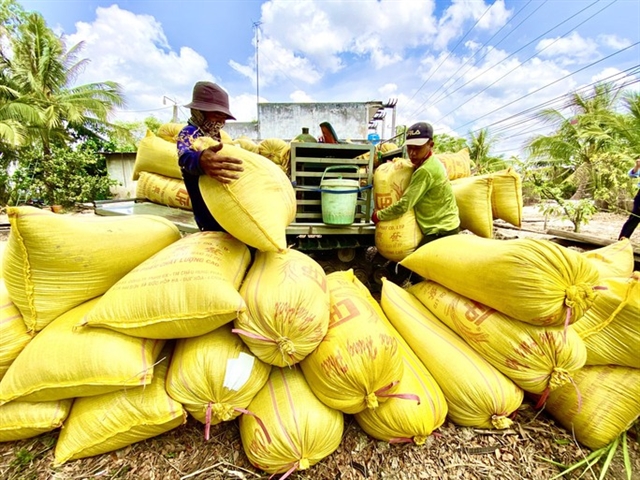 Economy
Economy

 |
Rice harvesting in the Mekong Delta – Photo: nld.com.vn
MEKONG DELTA – According to experts, the quality of Vietnamese rice has been recognised more in recent years, but inconsistency and logistical challenges are holding back its potential.
Phạm Quang Diệu, a rice market analyst at Agromonitor agricultural consultancy agency, said that Việt Nam’s rice exports in recent years had grown as international traders started to acknowledge the competitive strength of the country's rice.
Sticky rice from Việt Nam currently accounts for 70 per cent to 80 per cent of global exports of the product.
According to the Ministry of Agriculture and Rural Development, in the first five months of 2022, Việt Nam has exported nearly 2.8 million tonnes of rice, worth US$1.35 billion in revenue.
However, there are some obstacles limiting Việt Nam's rice exports.
Nguyễn Quốc Toản, head of the Agro-Processing and Market Development Authority (Agrotrade Vietnam) under the ministry, said that due to the effect of the global economic downturn during the COVID-19 pandemic, farmers’ profits suffered. In addition, high fertiliser prices had raised production costs.
Bùi Kim Thùy, an economic expert, suggested that boosting technical skill on food safety along with tariffs play a crucial part in the competitiveness of Vietnamese rice around the world.
“So, the industry needs to focus on creating high quality products with good branding”, Thùy said.
According to Trần Ngọc Thạch, chairman of Cửu Long Delta Rice Research Institute, the biggest drawback of Vietnamese rice right now is the inconsistent quality of exports.
This is due to the lack of large-scale farming plantations as currently most rice is grown on many small fields. These drawbacks cause many problems related to food security, hygiene and pesticide residues.
In order to improve the value of rice, the industry should consider developing better rice processing plants, monitor quality and build the brand name of Vietnamese rice.
Nguyễn Chánh Trung, deputy general director of agriculture company Tân Long Group, said that Việt Nam had a few rice brands that have received recognition, such as ST24 and ST25, as the best tasting rice in the world. The industry now needed to properly invest in improving the processing of rice.
Logistic infrastructure is another.
According to Đỗ Thu Hường, deputy marketing director of Sài Gòn Newport Corporation, 80 per cent of the Mekong Delta's exported goods travel through Hồ Chí Minh City and Bà Rịa - Vũng Tàu ports, making shipping expensive. While logistics adds an average of around 10 per cent to the price of a product globally, in the Mekong Delta, logistics costs add about 30 per cent to agricultural products. – VNS.